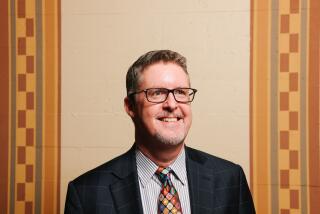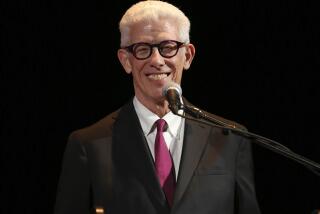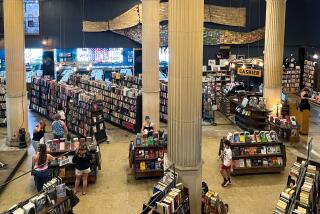Book smart: Ken Brecher
For Ken Brecher to say that being the president of the Library Foundation of Los Angeles is the best job he’s ever had -- well, that speaks volumes. Consider that he’s run the Sundance Institute, the Boston Children’s Museum and a major Philadelphia philanthropy; that he’s an anthropologist with a Rhodes scholarship and two research tours in the Amazon on his resume. The British playwright Christopher Hampton used Brecher’s field notes for his play “Savages.” He landed in Los Angeles as a theatrical “anthropologist in residence” -- a.k.a. associate artistic director -- at the Mark Taper Forum, exploring the then-uncharted territory of local subjects and underserved audiences.
Brecher’s office at the Richard Riordan Central Library downtown is an oooh-what’s-that museum of engaging objects from his travels, but, ever the anthropologist, he’s always more enticed by what he’s yet to discover -- in this case, right outside his office door.
Some timing -- you sign on to run the Library Foundation at a time when books seem to be going virtual and public libraries are getting the squeeze.
Libraries are an anchor institution of a community. To me, there are two great moments in the day: the moment the library doors open, and it looks like the January sales, like the Filene’s Basement sale -- people rush in to the Central Library. I’ve never seen anything like it -- you’d think every one of them has to get the same book.
The second great moment is after school. It’s the most dangerous time for a young person; Mom and Dad are both out working; there’s nobody home. You can go to the library, and in that library is exactly what you’re looking for -- other interesting, smart young people who also have homework to do.
The thing that really drew me to the Library Foundation [is that it] provides, for every student with a library card, a free tutor online every day of the week, seven days a week, from 3 until 10 o’clock at night. You say, I’ve got to write an essay about Jane Austen, or I’m struggling with geometry, and there’s a college graduate, a professor, a PhD student online [to] help you. Can you imagine what a gift this is?
Many people go to museums and come away feeling, “I didn’t understand that; I felt more comfortable in the gift shop than in the exhibit.” You never feel that in a library. Never. Librarians love technology, they love books, they love information and they love people -- now who else has that combination?
At the Canoga Park library, a group of young women was there to work on their prom dresses. This incredible librarian had books to show them how. There was a mother whose child had been killed, and [the librarian] was going to help her with her eulogy for her son. Everything [about a library] says, “Come on in, this belongs to you.”
Do the groups you ask for support say, hey, a library is a public institution -- let the public pay for it?
That’s one of the first things I say in any [fundraising] meeting: The city pays the librarians, it turns on the lights, pays for custodians and upkeep. The private Library Foundation does none of that. What we do is the programs -- the literacy programs, the reading programs, the support programs. I’m looking to support summer reading clubs and homework clubs.
People have [begun] saying: If we want to fund social services, we can do it through a library. If we want to fund afterschool education, we can do that through a library. Someone said to me, “We’re interested in young Latinas with a gift for mathematics,” and I said, “How many would you like to meet? Come with me now!”
And city funds for libraries are being cut too.
So shortsighted. My relatives were visiting and I gave them a midnight tour of the library. As we left, outside on the steps were young people with computers doing their homework. It’s the [library’s Wi-Fi] -- if they can get right onto the steps, they can do their homework. They are living in single-room occupancy, in the shelters, but they’re also students. They’d borrowed computers from the shelters and huddled on the steps of the Central Library doing their homework. And there are people who don’t think we should be open seven days a week? Maybe in the 21st century we should be open 24 hours a day!
You’re a trained anthropologist -- you must do field work just walking around the library.
I [saw] a person I’d have to describe as struggling. Most likely he was homeless, [with] a shopping cart at the door and a little dog tied to it and it was pouring rain. This person came in dripping wet, maybe in his early 20s, and he went to one of the free computers. I walked by him and did the thing you probably shouldn’t, and I’m embarrassed that I did, but I did peek over his shoulder and there was an email. It said, “Dear Sonny, where are you? Love, Mom.” And he wrote back, “Mom, I’m in Venice, California. Love, Sonny.” Where else in Los Angeles could that young man have used a computer [free]?
After your Amazon trips and other adventures, you worked at the L.A. Olympics and the Mark Taper Forum.
Gordon Davidson [founding artistic director of the Center Theater Group] brought me here as anthropologist in residence. He said, I have a series of subjects that interest me, and I’d love you to do field work on them and perhaps produce these plays with me, which I did. We worked on “Zoot Suit,” on “Children of a Lesser God.” It was thrilling. It was the beginning of a love affair with Los Angeles.
You spent more than a dozen years heading the Sundance Institute.
I was in my sister’s kitchen when I got a call from Robert Redford. He really wanted to define “independent” [movies] in a different way. I learned that film was not necessarily about the number of people who came to see it. Hollywood says it’s about the weekend grosses -- I [say] maybe it’s about how many people talk about it.
I created the documentary program and also a documentary fund. The thing that thrilled us at Sundance is the originality, the ideas, the community of people who are interested in ideas, people who do things way ahead of the curve.
The institute didn’t do the judging of films for the festival; did people buttonhole you anyway?
I couldn’t go anywhere without people handing me a script or wanting to talk about one. One of my closest friends, when his daughter’s film didn’t get into Sundance, he was so disappointed in me, and I said, “That’s not how it works.” [People] think, “I just made a $2-million contribution to your program, and I can’t get a three-minute short film by my grandson into the festival?” No, of course not. In the end they respect you more.
Do some people think you’ve moved backward, from a 20th century medium like film to an ancient one like books?
Very smart people are saying to me, “What’s it like there? Is it dusty? Is it quiet?” And my answer is, “Exactly the opposite.” Last year we had 155 million hits to the website. We had 17 million visits to the libraries. We had 18 million books and other materials in circulation. What the library’s going to be by the end of the 21st century It’s up to us to figure out a way to sustain it. Nothing to me is more at the forefront of thinking than libraries.
Your own experiences are like something out of a 19th century adventure novel -- including living in the Amazon, twice.
When I was 17 years old, I floated down a branch of the Mississippi on a raft with two friends. We were terrified, but we wanted to be like Huck Finn. I began to have what I thought of as expeditions -- sometimes they were to the local forest preserve. Lewis and Clark always fascinated me, and the notion of making contact with people very different than myself. That’s probably why I became an anthropologist.
When I did my field work in Brazil, it was before the first road crossed the country. We made contact with 15 tribes; one of those tribes was very isolated. They’re called the Wausha. I’ve never been able to go back. I certainly felt at home there; I felt more at home than I felt in my parents’ home.
Why is that?
I discovered the true nature of my being. I went into a kind of harmony. I loved being part of a tribe. I also loved that these were among the smartest, most generous people I’d ever known in my life.
These people, hunting with bows and arrows, without a written language, were deeply thoughtful philosophers. [They] understood that it was through storytelling that you put together the life you want to lead. They were natural historians. They were astronomers. They knew the movement of every star, the name and life habits of every plant in the jungle, every bird. A 10-year-old boy could identify every tree in the Amazon.
You must have felt like an infant.
When they saw the bottoms of my feet, they burst into laughter! Some women cried; they said, “Your poor mother -- she must have carried you [for years], because you can’t be this big and have soft, pink feet.”
The second time you went into the Amazon, you took a set of Shakespeare -- and you had to discard it. It sounds like an Evelyn Waugh novel.
I used my fellowship from the Ford Foundation to get someone to drop me there. The plane made a little rolling stop and I rolled out. There was pouring rain, the Amazon was flooded, [the guide and I] were walking through the forest. I was up to my knees, I was up to my waist. My pack had to go onto my head to keep it dry.
I thought, “This is too heavy. I’m not going to make it.” I had a complete miniature set of Shakespeare, bound in red Moroccan leather. I only kept “King Lear.” First, I thought, “I won’t need the comedies. And ‘Hamlet,’ I know how it ends. I’m too close in age to Hamlet. Lear is a long way off.” And I literally watched my little red Shakespeares floating away. And then I laughed out loud. I thought, “Who’s going to find those? What are they going to think?”
This interview was edited and excerpted from a longer taped transcript. Interview archive: latimes.com/pattasks.
More to Read
A cure for the common opinion
Get thought-provoking perspectives with our weekly newsletter.
You may occasionally receive promotional content from the Los Angeles Times.







